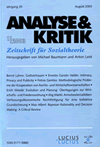Suchergebnisse
"Andreas Flache"
Titel: How May Virtual Communication Shape Cooperation in a Work Team? A Formal Model Based on Social Exchange Theory
Autor: Andreas Flache
Seite: 258-278
Abstract: This paper addresses theoretically the question how virtual communication may affect cooperation in work teams. The degree of team virtualization, i.e. the extent to which interaction between team members occurs online, is related to parameters of the exchange. First, it is assumed that in online interaction task uncertainties are higher than in face-to-face contacts. Second, the gratifying value of peer rewards is assumed to be lower in online contacts. Thirdly, it is assumed that teams are different in the extent to which members depend on their peers for positive affections, operationalized by the extent to which team members are interested in social relationships for their own sake, independently from their work interactions. Simulation results suggest both positive and negative effects of team virtualization on work-cooperation.
Titel: Rational and Adaptive Playing
Autor: Rainer Hegselmann / Andreas Flache
Seite: 75-97
Abstract: n this paper we compare two micro foundations for modelling human behaviour and decision making. We focus on perfect strategic rationality on the one hand and a simple reinforcement mechanism on the other hand. Iterated prisoner's dilemmas serve as the play ground for the comparison. The main lesson of our analysis is that in the space of all possible 2x2 PDs different micro foundations do matter. This suggests that researchers can not safely rely on the assumption that implementing simple models of decision making will yield the same results that may be obtained when more sophisticated decision rules are built into the agents.

Trust and Community on the Internet. Opportunities and Restrictions for Online Cooperation
2004 (26) Heft 1
Guest-Editors: Bernd Lahno / Uwe Matzat
Editorial
Early studies in the area of Internet Research emphasized the deficiencies that computer-mediated communication as opposed to face-to-face communication would have. The chances for the evolution of cooperative relationships on the Internet were assessed sceptically. Present research findings correct this point of view. In spite of a missing central authority, without formal controls and sanctions, with anonymity and easy-to-use exit options there is not only chaos and anomy on the Internet. Rath...